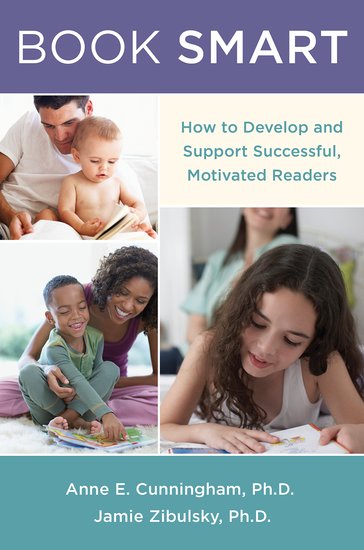Throughout the process of reading development, it is important to read with your child frequently and to make the experience fun, whether your child is a newborn or thirteen. This may not sound like news to many parents, but the American Academy of Pediatrics is just announcing their new recommendation that parents read with their children daily from infancy on, and it is expected that this announcement will serve as a reminder to many parents and a call for educators and policymakers to help parents who lack the time, resources, and skills to read with their children encourage reading development. We are so excited about this new development because the benefits of shared reading accrue over time and we believe that this announcement will create the energy needed to help many young children become successful, motivated readers.
Although reading together is important at all ages, the specific strategies parents use will change dramatically as their children get older. The strategies parents use will also be dependent upon their children’s interests, temperament, and abilities. There is no one “right” way to read together.

Figuring out the best way to engage in shared reading with a child while he or she is young gives parents an opportunity to use cuddle time together as a way to also help a child understand a book more deeply, and to simultaneously teach specific reading skills. Perhaps as important, children who have an enthusiastic reader as a role model may stay determined to learn to read, even when facing challenges, rather than becoming easily discouraged. The magic of shared reading comes from this combination of warm, interpersonal experiences, playful and captivating storytelling, and opportunities for learning. This winning combination helps children not only learn to read, but learn to love and value reading.
There are many questions that parents often ask about reading together with their children, and some of those questions are answered below. We hope that thinking through these issues inspires parents to start reading with their children regularly (even if they are already a bit older), and create family reading rituals that last a lifetime!
How can I get my child more engaged in reading time?
If you are having difficulty engaging your child in reading time, try searching for books on topics that she finds interesting (even if those topics are not ones that you find engaging). If your child enjoys looking at comic books, embrace this type of reading, rather than discouraging it. Although it might be surprising to hear, they include much richer language than we encounter in a typical day. Reading any printed material also helps children get comfortable turning pages, and give you the chance to talk with your child about new ideas and vocabulary words.
Many children also respond well to having some freedom and getting to make choices during reading time. You may want to let your child to choose the book you will be reading, whether you are picking books out in the library or off your own bookshelf. You can also let your child select where and when you will read…within reason, of course.
Most importantly, try to make the reading experience enjoyable by focusing on what goes well. Praise your child just for sitting down with you to read, even if she only wants to sit briefly. The next day, try to get her to sit through a few pages of the story and sit a bit longer. Reading time should be a time to relax and bond with your child. If she acts up, simply end reading time, but do so calmly and try again later.
How do I know if my child is actually listening while I am reading to him/her?
Asking questions throughout the story that actively engage your child in the reading process should encourage him to listen more closely while you are reading. If you think your child is not listening as you read, try asking a question or two on each page in order to get your child to interact with the story and actively express himself. If he seems particularly distracted, simply end reading time, but do so calmly and try again later.
How long should I spend trying to explain something to my child if they get frustrated?
Reading time should be a relaxing, bonding experience for both you and your child. Rather than trying to teach many new skills during any one reading session, pick just one idea to focus on each day, whether it is a new vocabulary word or letter to identify. Setting manageable reading goals will help make this time feel fun, rather than stressful, for you both.
If you ask a question about a book that your child is having trouble understanding, respond calmly and either restate your question in a simpler way or give a clue regarding the correct answer. If she seems to be frustrated, move on and return to the concept at another time. Story concepts might become clearer to children with repeated readings of the same story.
What if my child wants to read the same book every night?
Repeated readings of a story actually help children to more deeply understand the plot. In addition, your child will grow more familiar with the story and the words that make it up. You can even try having your child read to you. If he is familiar with the book, he might be able to decode words he would not be able to decode in an unfamiliar context. If your child is not ready to actually read the words on the pages, have him retell the story to you using the pictures and what he recalls from other readings of the story. By asking questions and making comments, you can continue to build his vocabulary and background knowledge, even while reading a familiar story.


Recent Comments
There are currently no comments.